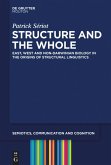Structuralism is an approach to the human sciences that attempts to analyze a specific field (for instance, mythology) as a complex system of interrelated parts. It began in linguistics with the work of Ferdinand de Saussure (1857-1913). But many French intellectuals perceived it to have a wider application, and the model was soon modified and applied to other fields, such as anthropology, psychoanalysis, literary theory and architecture. This ushered in the dawn of structuralism as not just a method, but also an intellectual movement that came to take existentialism's pedestal in 1960s France. Structuralism enjoyed little popularity, and its general stance of antihumanism was in sheer opposition to the Sartrean existentialism that preceded it. But in the 1970s, it came under internal fire from critics who accused it of being too rigid and ahistorical. However, many of structuralism's theorists, from Michel Foucault to Jacques Lacan, continue to assert an influence on continentalphilosophy, and many of the fundamental assumptions of its critics, that is, of adherents of poststructuralism, are but a continuation of structuralism.
Bitte wählen Sie Ihr Anliegen aus.
Rechnungen
Retourenschein anfordern
Bestellstatus
Storno








